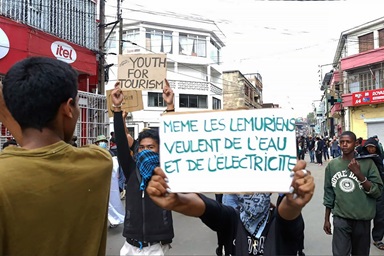Si la régionalisation est ratifiée, les Méthodistes Unis devront faire davantage d'efforts pour maintenir leurs liens, et l'un des moyens d'y parvenir est la mission.
Tel était le message délivré par trois évêques méthodistes lors d'un rassemblement des responsables des Volontaires Méthodistes en Mission (United Methodist Volunteers in Mission) de tous les États-Unis. Les évêques ont discuté de la série d'amendements à la constitution de la dénomination qui, s'ils étaient ratifiés, donneraient aux différentes régions géographiques de la dénomination une autorité égale pour adapter certaines parties du Livre de Discipline, le recueil des règles de la dénomination.
« La régionalisation est vraiment une occasion pour les différentes régions de notre connexion de vivre notre mission, notre théologie et notre politique dans leur contexte », a déclaré l'évêque Robin Dease, qui dirige les conférences de Géorgie du Nord et de Géorgie du Sud.
« Personnellement, je pense que la régionalisation est également un autre moyen de lever le voile de la colonisation. »
Le vote étant toujours en cours, les Méthodistes Unis ne sauront pas avant début novembre si la régionalisation sera ratifiée. Pour être ratifiées, les modifications constitutionnelles doivent être soutenues par au moins deux tiers du total des votants de la conférence annuelle mondiale.
L'une des préoccupations est que la régionalisation, avec sa plus grande flexibilité en matière de politiques ecclésiastiques, nuise à l'identité commune des Méthodistes Unis, qui s'étendent sur quatre continents.
« C'est le risque : que nous nous déconnections », a déclaré l'évêque Kristin Stoneking, qui dirige la Mountain Sky Conference. « Mais l'opportunité est que nous pourrions nous appuyer encore plus fortement sur une compréhension réelle de qui nous sommes en tant que wesleyens et Méthodistes Unis, et comprendre nos pratiques religieuses, nos disciplines spirituelles et notre histoire beaucoup plus profondément que nous ne le faisons actuellement. »
Mais, a-t-elle ajouté, rester connectés exigera une volonté délibérée.
L'un des aspects du ministère qui unit les Méthodistes Unis à travers le monde est leur engagement commun envers la mission. Mais à l'heure actuelle, selon la Discipline, les Volontaires Méthodistes Unis en mission sont organisés par les juridictions américaines.
Cependant, les Méthodistes Unis d'autres régions du monde participent également au type de missions à court terme soutenues par l'UMVIM, a déclaré la révérende Judy Chung, du Conseil Méthodiste Uni des Ministères Mondiaux.
« Si vous vous rendez en Afrique et que vous discutez avec nos frères et sœurs Méthodistes Unis, vous constaterez qu'ils envoient des équipes de bénévoles dans d'autres régions, non seulement au sein de leurs propres conférences annuelles, mais aussi dans les pays voisins », a déclaré Mme Chung, directrice exécutive du service missionnaire de l'agence, à l'assemblée. « Ils ne l'appellent peut-être pas UMVIM, mais il existe également un mouvement de bénévolat actif dans ces régions. »
Elle voit une opportunité pour ces mouvements de bénévolat de fonctionner sous une même égide à un moment donné.
L'évêque David Bard, qui dirige la Conférence du Michigan et codirige la Conférence Illinois Great Rivers, a décrit certains des fondements théologiques de la régionalisation.
L'un d'eux est la croyance que le Saint-Esprit est présent dans chaque disciple de Jésus.
« Cela ne signifie pas qu'une personne ne peut pas être plus sage qu'une autre sur un sujet donné », a-t-il déclaré. « Mais cela signifie, je pense, que nous avons tous de la sagesse et que nous devons prêter attention à cette sagesse et à notre contexte. »
Une autre idée théologique qui soutient la régionalisation trouve son origine dans l'Église catholique romaine. Il s'agit de la subsidiarité, le principe selon lequel les décisions doivent être prises au plus près des personnes qu'elles concernent.
« La régionalisation nous offre l'opportunité de trouver de nouvelles façons d'être connectés dans la mission et le ministère, ce qui nous permettra de continuer à travailler ensemble », a déclaré M. Bard.
« Nous n'allons pas tous penser de la même manière à travers le monde en tant que Méthodistes Unis. Espérons qu'il y aura suffisamment de ressemblances familiales pour que nous puissions nous reconnaître les uns les autres. Mais si nous voulons que cela fonctionne et que nous soyons une forme vivante d'Église, nous devrons trouver de nouvelles façons de nous connecter les uns aux autres dans la mission. »
Retour à l'article principal :
Les bénévoles en mission entament un nouveau chapitre
Hahn est rédactrice en chef adjointe de UM News. Vous pouvez la contacter au (615) 742-5470 ou à l'adresse newsdesk@umcom.org. Pour en savoir plus sur l'actualité Méthodiste Unie, abonnez-vous gratuitement aux résumés de UM News.




